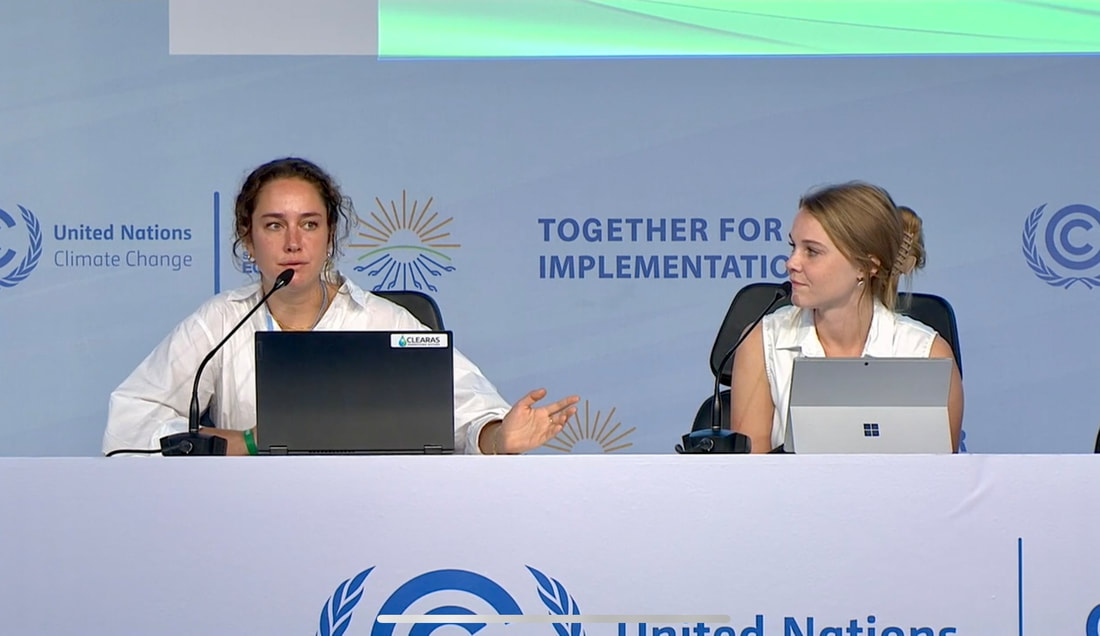.Jessica Daignault and Emily Rutledge at COP 27
Emily Rutledge “Policy change will happen slowly, but we have the power to initiate change with on the ground solutions.”
Montana Tech assistant professor of Civil Engineering, Dr. Jessica Daignault, traveled with recent Montana Tech M.S. graduate Emily Rutledge to COP27. Rutledge graduated with a Master of Science degree in Environmental Engineering in May 2022. She works for CLEARAS Solutions as a bioresources scientist. The duo gave a press conference at the COP that summarizes the results of a recent life cycle assessment study, completed by Dr. Daignault and Ms. Rutledge, which quantifies the environmental impact of the CLEARAS Solutions patented ABNR tertiary wastewater treatment system. The research was also shared in a climate-solutions display at the United States Center in partnership with the U.S. Department of State. Additionally, Dr. Daignault moderated a panel discussion as a member of the Youth Environmental Alliance in Higher Education titled "Climate Leadership Across Generations," highlighting innovation and advances in climate action, sustainability, and resilience-related initiatives at Montana Tech and college campuses across the United States. Tate Besser of the University of Montana also participated on the panel.
Emily attended Michigan Technological university for her undergrad education in environmental engineering and graduated in May 2020. After graduation from Michigan Tech, she moved to Montana to attend Montana Technological University to get her Master’s in Environmental Engineering as well. Both universities allowed her to pursue hobbies like downhill skiing, mountain biking, hiking and camping. She started working for CLEARAS Solutions part time while still in grad school at Montana Tech and went full time with them after graduation. They are based in Missoula and have project around the country. They have created and patented a plant based bioresource recovery system that also treats wastewater at a tertiary level. They use algae to uptake the nutrients found in wastewater and then can reuse the algae or harvest it to make biomaterials like bioplastics, inks, foams and other things. This creates a circular economy, while sequestering CO2 in order to feed the algae. The company also shows great potential for net negative emissions and are dedicated to exploring renewable energy to get us to that point.
Dr. Jessica Daignault has a B.S. in Environmental Engineering, a M.S. in Civil Engineering, and a Ph.D. in Civil Engineering (all from Michigan Technological University). She is a Montana Tech assistant professor of Civil Engineering. As a civil engineer, she cares about climate as it impacts the design and implementation of community infrastructure and built environment around the world. Increased intensity of storm events and the unpredictable nature of climatic patterns creates new challenges for those working to design infrastructure that supports and protects the public. As an individual, she cares about climate as it disproportionately impacts marginalized countries and demographics who do not have access to the resources and support required to withstand challenges associated with a changing climate. She feels that our job as global citizens is to take care of one another. In her free time, Dr. Jessica enjoys horseback riding, mountain biking, fishing, drawing/painting.
Emily Rutledge “Policy change will happen slowly, but we have the power to initiate change with on the ground solutions.”
Montana Tech assistant professor of Civil Engineering, Dr. Jessica Daignault, traveled with recent Montana Tech M.S. graduate Emily Rutledge to COP27. Rutledge graduated with a Master of Science degree in Environmental Engineering in May 2022. She works for CLEARAS Solutions as a bioresources scientist. The duo gave a press conference at the COP that summarizes the results of a recent life cycle assessment study, completed by Dr. Daignault and Ms. Rutledge, which quantifies the environmental impact of the CLEARAS Solutions patented ABNR tertiary wastewater treatment system. The research was also shared in a climate-solutions display at the United States Center in partnership with the U.S. Department of State. Additionally, Dr. Daignault moderated a panel discussion as a member of the Youth Environmental Alliance in Higher Education titled "Climate Leadership Across Generations," highlighting innovation and advances in climate action, sustainability, and resilience-related initiatives at Montana Tech and college campuses across the United States. Tate Besser of the University of Montana also participated on the panel.
Emily attended Michigan Technological university for her undergrad education in environmental engineering and graduated in May 2020. After graduation from Michigan Tech, she moved to Montana to attend Montana Technological University to get her Master’s in Environmental Engineering as well. Both universities allowed her to pursue hobbies like downhill skiing, mountain biking, hiking and camping. She started working for CLEARAS Solutions part time while still in grad school at Montana Tech and went full time with them after graduation. They are based in Missoula and have project around the country. They have created and patented a plant based bioresource recovery system that also treats wastewater at a tertiary level. They use algae to uptake the nutrients found in wastewater and then can reuse the algae or harvest it to make biomaterials like bioplastics, inks, foams and other things. This creates a circular economy, while sequestering CO2 in order to feed the algae. The company also shows great potential for net negative emissions and are dedicated to exploring renewable energy to get us to that point.
Dr. Jessica Daignault has a B.S. in Environmental Engineering, a M.S. in Civil Engineering, and a Ph.D. in Civil Engineering (all from Michigan Technological University). She is a Montana Tech assistant professor of Civil Engineering. As a civil engineer, she cares about climate as it impacts the design and implementation of community infrastructure and built environment around the world. Increased intensity of storm events and the unpredictable nature of climatic patterns creates new challenges for those working to design infrastructure that supports and protects the public. As an individual, she cares about climate as it disproportionately impacts marginalized countries and demographics who do not have access to the resources and support required to withstand challenges associated with a changing climate. She feels that our job as global citizens is to take care of one another. In her free time, Dr. Jessica enjoys horseback riding, mountain biking, fishing, drawing/painting.

